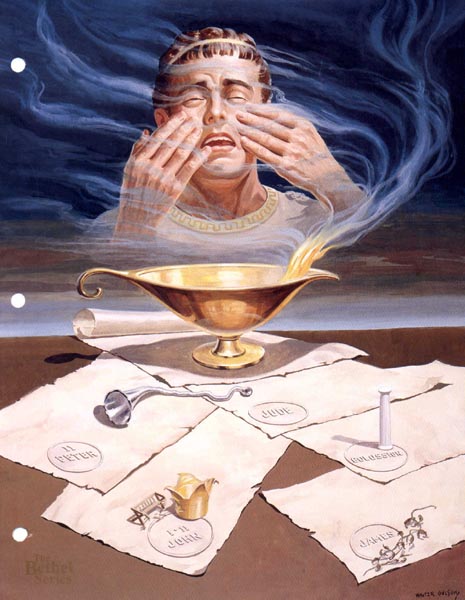New Testament - Colossians, James, 2 Peter, 1 and 2 John, Jude
|
Dual Perversions - Two basic perversions threatened the early church. Study Ten explored the deviation that came from Jewish legalism. This study looks at the more subtle deviation that came from Greek speculation, known as Gnosticism. What Was Gnosticism - This philosophical religion interpreted Christianity as a system of "higher knowledge" (gnosis), by which the intellectually elite could reach a loftier level of spiritual truth than was possible for the rank-and-file Christian.
Colossians - Paul learned that a subversive line of thinking was being taught in the Colossian church. Some members were being persuaded that the gospel was not enough for salvation and that it was necessary to add something to it. Paul warns against Jewish legalism, specifically against unfounded confidence in legal ordinances, food regulations, sabbath, and new moon observances. Paul warns against the Gnostics who insist upon "self-abasement and worship of angels." Against this mixture of Jewish legalism and Gnostic philosophy, Paul declares that salvation is in Christ and in Christ alone and that he reigns supreme in all things. In Christ, all wisdom and knowledge are concentrated and is available to all believers. Those who regard Christ as a "high grade angel" and have subordinated the Master to a secondary role in the redemptive process must be reminded that in Christ, "the whole fullness of the deity dwells bodily." He is "the head of all rule and authority", and he has "disarmed the principalities and powers and made a public example of them." Jude - Some Gnostics believed that since the body was evil, it was irrelevant to salvation and could not effect one's spiritual destiny. Salvation was a matter only of the spirit. It made no difference whether one humbled the flesh in self-denial or abused it by unrestrained indulgence. It was all the same. Such thinking issued in libertinism and lawlessness. Jude confronts this by urging the church "to contend for the faith which was once for all delivered to the saints" and lashing out with fury against those pseudo-Christians who have professed their faith in Jesus Christ, but who have taken advantage of the freedom of the gospel by casting off all moral restraints. By doing so, they "pervert the grace of our God into licentiousness" and by their conduct show themselves to be utter strangers to God. God's judgment has fallen upon the rebellious Israelites, his chosen people, many times in the past. The grace of God does not provide any with a license for licentiousness. 1 and 2 John - The Gnostic reasoned that since the material world is evil and since the body is part of that world, the divine God would not assume a body of flesh whose substance was evil. Therefore, the body our Lord took at his coming must not have been a real body but a phantom one. The Gnostic denied the coming of Jesus in the flesh. John attacks this heretical teaching by boldly asserting that the rock bed of Christian conviction rests on the fact that the word became flesh and that many on the earth were eyewitnesses of his coming. Eyes have beheld him, hands have touched him, ears have heard him. All else to the contrary, is merely delusive doctrine. 2 Peter - A right relationship with God must issue in a godly life. None should make light of Christ's coming in the flesh and that Christ will come again is a certainty. As for those who scoff at his return, let them be reminded that once before God brought judgment upon the world with a flood. Beware of immorality and lawlessness, lest in the last times you will fail to lay hold of the promises laid up in eternity for you. James - Religious faith must issue in religious life, or it is mere delusion. Attacking those who profess faith, but demonstrate no fruits of faith, James asserts that:
Summary - Gnosticism posed a serious threat for the early church. Asceticism, libertinism, and rationalism, which sought to deny both the divinity and humanity of Jesus, would have undermined God's truth had not the leaders of the early church risen up and warned the fellowship against the imposition of these ideas upon the faith "once for all delivered to the saints." Many attitudes and characteristics of the Gnostic heresy are manifest today:
|
 |
| Lesson 18 and its symbolism: The six manuscripts - Epistles: Colossians, James, 2 Peter, 1 and 2 John, and Jude. Lamp and smoke - Each of these six letters express a concern over false teaching in the church. Figure's face - The writers contend that false teaching can blind and deceive the believer. Therefore, the fellowship must concern itself with sound doctrine. Greek column on Colossian manuscript - Paul warns the church at Colossae against the heretical influences of the Greek philosophical schools. Battered trumpet on 2 Peter and Jude manuscripts - Peter and Jude sound a warning against those who maliciously distort the faith first delivered to the saints. Broken crib and battered crown on 1 and 2 John manuscript - John calls the church to be on guard against those who deny either the divinity or the humanity of Jesus. Dead wreath on James manuscript - James warns against a faith which produces no good works.
|